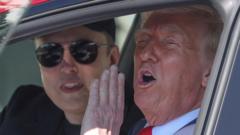Amid a steep decline in revenues and profits, Elon Musk has announced plans to lessen his role in the Trump administration, a move analysts speculate could influence Tesla's recovery strategy as it grapples with external political and economic pressures.
Musk Restructures Role in Washington as Tesla Faces Profit Decline

Musk Restructures Role in Washington as Tesla Faces Profit Decline
Elon Musk's decision to reduce involvement in Trump's administration comes as Tesla's revenues plummet significantly, challenging the electric carmaker's future.
Elon Musk, CEO of Tesla, has communicated intentions to curtail his participation in Donald Trump’s administration following a substantial drop in Tesla’s profits and revenues. In the first quarter of 2025, the electric vehicle manufacturer reported a staggering 20% decline in automotive revenue compared to the same period last year, with profits witnessing a more than 70% fall. This financial downturn has sparked concerns among investors, who are now being warned of the potential for further struggles, especially attributed to "changing political sentiment," which may impact demand.
Musk acknowledged that his political involvement has diverted attention from Tesla, conceding that it played a role in the poor financial results. His recent engagement in the Trump administration, particularly his role in leading the Department of Government Efficiency (Doge), faced backlash, culminating in widespread protests against Tesla. Despite the criticisms, Musk defended his commitment to Doge as "critical" but stated he would reduce his government work to one or two days a week, asserting that this decision is intended to refocus efforts on the automaker.
Financial results disclosed a total revenue of $19.3 billion, which came in below expectations of $21.1 billion. The decline coincides with ongoing price reductions aimed at attracting customers, as the market sees a configuration shifting under tariffs imposed by the Trump administration on imports from China. These tariffs impact Tesla’s supply chain significantly, as many critical components are sourced from China, increasing operational costs amid already tight margins.
In previous discussions about trade, Musk has publicly clashed with Trump administration figures like trade adviser Peter Navarro, who suggested Musk was merely a car assembler. Musk rebutted these comments and emphasized his advocacy for lower tariffs, stating they continue to exert pressure on Tesla even with localized supply chains.
Shareholder confidence appears shaky amid fears of fierce competition in the EV landscape and the ramifications of Trump's trade war, highlighted by AJ Bell's investment analyst who described expectations for Tesla as "rock-bottom." Tesla's share values have dropped by around 37% this year alone, though they experienced a peak in after-hours trading following the latest report. Advantages from artificial intelligence have been hinted at as a potential area of future growth, yet skepticism remains within the investor community.
As Tesla navigates these turbulent waters, Musk's scaling back on governmental duties signals a potential shift in focus back to core business operations, aiming to stabilize the company's performance in a challenging economic environment.





















